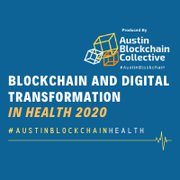Austin Blockchain Symposium to Address if Blockchain Tech Can Help Solve Health Care’s Data Problems2/7/2020 By Anjum Khurshid, M.D., Ph.D., Director of Data Integration, Department of Population Health, Dell Medical School  At the annual meeting of the Office of National Coordinator for Health Information Technology in Washington, D.C., the secretary of Health and Human Services declared that even he could not get access to his patient records. This may have surprised a few but not anyone who has either dealt with multiple caregivers or someone in the business of health information technology. However, it does present a stark reality that even those who are well-informed and have actual regulatory authority of the government of the United States are unable to get what is considered a fundamental right of a patient, not to mention such complete records being essential for coordinated and efficient care. The other rather unfortunate aspect of the situation is that no one is claiming this issue will be solved in the very near future. We will make some progress on this, but, particularly as it relates to patients having access and control over their own medical data, it is still an elusive target. Federal policies including the 21st Century Cures Act and the newly released 2020-2025 Federal Health IT Strategic Plan keep reiterating the emphasis on patients’ right to access their data, but there is little to show on the ground. Most of the reasons why our health care system is so fragmented and why patients find it so hard to navigate and get access to their own medical data are deep-rooted in the culture, structure and business of health care. However, there are also a number of technical hurdles related to data privacy, security and exchange that have yet to be addressed in a way that protects individual privacy and confidentiality while at the same time makes access to that information easy and ubiquitous. Blockchain technology is increasingly being considered as an avenue that may solve some of these deep-rooted issues in a disruptive and innovative way while promising individual ownership and control over personal data. How blockchain technology may address these problems and what applications are being developed for use in health care are research topics that are squarely in line with Dell Medical School’s mission to rethink health and promote innovation in medicine using technology. Fortunately, there is a very relevant event in Austin on Feb. 26 that will cover these questions and more. Organized by the Austin Blockchain Collective, the representative group for some 120 blockchain companies in Austin, the Blockchain and Digital Transformation in Health symposium offers a unique academic and industry forum on this topic. I want to particularly encourage fellow academics, researchers and health professionals who want to learn more about these new technologies and their applications in health care to consider attending this symposium. The academic track of the symposium includes leading experts from The University of Texas at Austin and Dell Medical School, who will present existing work and future opportunities for research. I am particularly excited to hear the academic keynote by the University of California, San Diego, associate dean for informatics and technology Lucila Ohno-Machado, M.D., Ph.D. She leads a successful research program on blockchain technology for biomedical sciences at the UC San Diego School of Medicine. Ohno-Machado is also one of the most respected names in health informatics. She is a member of the National Academy of Medicine, chief editor of the Journal of American Medical Informatics Association and has served on several National Institutes of Health review committees. The academic presentations will include blockchain applications in prevention of HIV, generation of real-time scientific evidence, identity management for people experiencing homelessness and clinical topics in neurology and medicine. Research related to health care operations, price transparency and data analytics using new technologies will also be presented. The academic sessions will present opportunities for collaboration among faculty from different disciplines as well as engage industry experts to identify academic partners who may help in developing viable, robust solutions for the market. The symposium is offering special registration rates for faculty and students from The University of Texas at Austin and health care organizations affiliated with Dell Medical School.
1 Comment
|
NewsTune in here for latest Symposium news and thought leadership. ArchivesCategories |


 RSS Feed
RSS Feed
